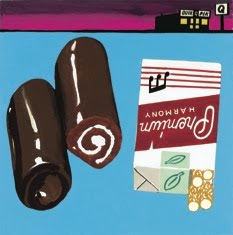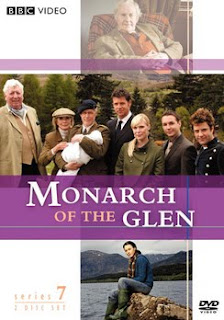 Many years ago, there was a BBC series called The Living Soap. It was a short-lived fly-on-the-wall documentary series about students in Manchester (so, fly-on-the-magnolia-painted-wall, then).
Many years ago, there was a BBC series called The Living Soap. It was a short-lived fly-on-the-wall documentary series about students in Manchester (so, fly-on-the-magnolia-painted-wall, then).
This was back in the early 1990s, and it was prescient of a lot of current TV reality fare, in that the students were filmed going about their everyday lives. However, unlike the majority of such shows which you’ll see now, the episodes were put out at much the same time as they were being made, which caused it to become a bit self-regarding; if memory serves, people in the show would find out things others had said or done by watching a previous episode and seeing events they’d not been present at, and this information would affect how they behaved. Or people in the street would insult or otherwise engage with members of the ‘cast’, on the basis of how they’d been portrayed in previous episodes.
Obviously, you can’t really aim for or maintain verite in that kind of situation, and the show was pulled earlier than planned. But I rather enjoyed it at the time – I’ve often found myself interested in programmes showing what happens when people are shoved together in an environment; perhaps because I’ve lived in a variety of shared houses in the past, both as a student and later in life. Anyway, the main lesson which seemed to be learned from The Living Soap was that you shouldn’t broadcast episodes of this sort of show while it’s still being filmed, as you end up with a snake-eating-its-tail situation.
A similar show (which started at around the same time) is MTV’s The Real World. Sticking together a handful of young people (have I just coined a collective noun there?) in a flat or apartment and filming what happened, this show’s one of MTV’s biggest successes, and runs to this day. We can pretend that it’s a fascinating social experiment or whatever, but really the appeal of the show is a more base one, that of having a good old nose at people’s private(ish) lives. I’m not being snobbish in saying that, as I have a great deal of fondness for The Real World, particularly the Seattle-based season.
The production company wisely chose to film all the episodes of The Real World before airing them, which seems to have worked on the whole, but the fact it’s broadcast, and has been for many years now, means cast members occasionally have things like “Real World sucks!” shouted at them in the street during filming. But more pertinently to the point I’ll get round to making eventually, the long-running nature of the show means that it’s become a bit of a magnet for people who want to be on TV or use it as a springboard to other careers.
I’d see this as a problem in production terms, because instead of having a programme about (say) seven average-ish people trying to get along in a flatshare, you end up with a flat containing a number of almost-stereotypes and wannabes: racists are invariably put alongside people of other races, political conservatives are put with liberals, homophobes with gay men, and so on. Add to that the fact that some of the people see the show as their calling card to stardom (despite all evidence to the contrary about such a ploy), and you can end up with an apartment which appears to have been deliberately populated with wannabes from a number of carefully-selected demographics (as The Onion pointed out).
Sure, it’s still interesting to watch (that base level of interest I mentioned above still applied), but it’s certainly a drift from the original intent, and a more self-regarding one again; perhaps inevitably over time, seeing people arguing over who gets what bed apparently isn’t enough, and instead there’s an expectation that the audience will want to see an alcoholic bisexual jumping into a swimming pool and losing her bikini top or something (Real World Hawaii, I think). In much the same way, Big Brother‘s first series featured a mix of people, but by the time the show was facing the axe, the house appeared to have been populated by caricatures whose motivation for auditioning appeared to be either a desire to seek the attention they didn’t get in their childhood, or to get a photospread in Nuts, Zoo, or both. No wonder Big Brother‘s ratings fell, why watch TV when you can see people attention-seeking or disrobing on any High Street in the UK any night of the week?
All of which brings me, circuitously, to the current series of TV singing talent contest The X Factor. I’ve not been watching this year, instead preferring to glean my information about the show from the front covers of pretty much all print media in the UK over the past month or so; in terms of long-term imprinting in my brain, this is pretty much the same as following it anyway because – let’s all be honest – the turnover of ‘stars’ in this programme makes a McDonald’s counter look like a place where people linger. There’s a current thing where Simon Cowell’s issuing press statements about an act called Jedward (whose schtick seems to be that they’re twins with haircuts like Yahoo Serious in Young Einstein) saying how much he hates them and wants them out, which of course makes the oh-so-wilful (though not very perceptive) audience vote for them to remain in the show… that’s phone voting, which of course means that money from each call goes into the coffers of SyCo, the production company behind the show, which is owned by, you guessed it, Simon Cowell. I don’t know Cowell personally, but I don’t know if the best way to show your disapproval and disagreement with him is to give him money. It looks suspiciously like positive reinforcement to me.
The link between the ‘reality shows’ I referred to earlier and The X Factor, I feel, is that as time has gone on, the latter has similarly had to up the ante; it’s become abundantly clear that the venn diagram-style overlap between the viewing audience and the people who’ll buy the winner’s CDs is pretty slight, so the voting process (with the call-in votes that cost money) becomes the greatest element of the story; fights – verbal and physical – or romances between the contestants fill acres of newsprint, the judges are friends or bitter rivals depending on which day of the week it is, judges issue decrees stating that certain acts are bound to win or should be kicked out, and there’s an amazing amount of speculation about who’ll get kicked out this week and who’ll win, even though that’s almost incidental (as the music is, much of the time) to the majority of the viewing audience.
It doesn’t seem to be enough that someone with moderate singing ability (and I say ‘someone’ as opposed to ‘some people’ because groups rarely win – in fact, has a group ever won The X Factor?) is plucked from obscurity, given some voice training and a new wardrobe and propelled to the top of the charts by a huge marketing and management campaign – a series of events which is rare and unusual enough to surely be of note; it seems we need them to have overcome some personal hardship such as a life-threatening illness or the death of a supportive relative, a vicious bit of catfighting in bootcamp, a bad choice of song in the semi-finals, and then some pantomime slating from one of the judges, before being crowned the winner and releasing some suitably rousing song in time for Christmas. And then they’re promptly pretty much forgotten about for the best part of a year, when they’re wheeled out to ride the (almost identical) wave of publicity and hoo-hah surrounding the new series (unless they don’t bother, which sometimes happens; Leon Jackson, for example). The show may be startlingly aware of itself and the need to feign conflict and drama and tragedy, but it’s reliant on the viewing (and voting) public being oblivious to such machinations.
Many years ago, I went for an interview for a job in Virgin Megastore. The chap asked me what kind of music I liked, and I replied – as I probably would now – that I tended to like bands or artists who had more than one album to them. The chap looked vaguely appalled, and I didn’t get the job – only years later did it occur to me that the ‘one hit album or single’ churn was probably a sizable amount of business for music shops, and by extension the music industry. And in a similar way, I suspect that the production team of The X Factor has realised that the journey (a word which is often used without any kind of self-awareness in such shows) is more important than the destination. You may not be able to convince people to splash out on the Eoghan Quigg CD, but you can issue ‘shocking statements’ to try to convince them that paying for premium rate phone calls to keep Jedward in the race for first place is worth it. Or pursue any other tactic to keep press coverage running between shows and generate a sense of importance about the whole thing.
I know what you’re thinking: John, you think about this stuff waaaaay too much. And you might well be right, but I say this in response: Everything I’ve said above about The X Factor has almost certainly been thought (if not explicitly stated in meetings) by people on the production team. I’m not a marketing and money-making genius, but you can bet your calls made after this time will not be counted but may still be charged that SyCo has several such geniuses on their payroll.
Anyway, I want Jimmy Nipples to win. He’s still in it, right? No? Oh. He must have been knocked the other week or something. See, told you I wasn’t really paying attention to it.
 As I mentioned last week, I’m not following The X-Factor, but of course that doesn’t mean I won’t make jokes about it.
As I mentioned last week, I’m not following The X-Factor, but of course that doesn’t mean I won’t make jokes about it.








